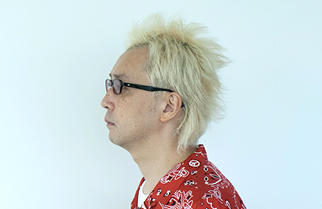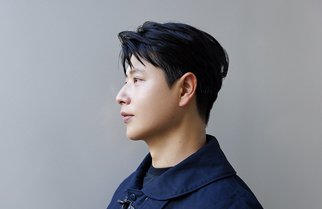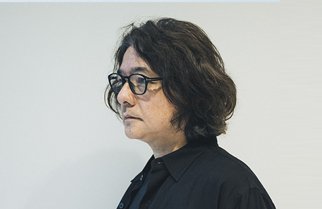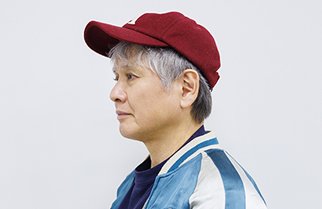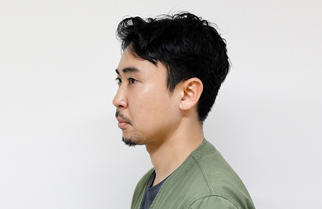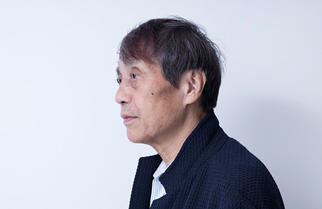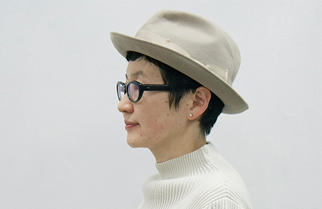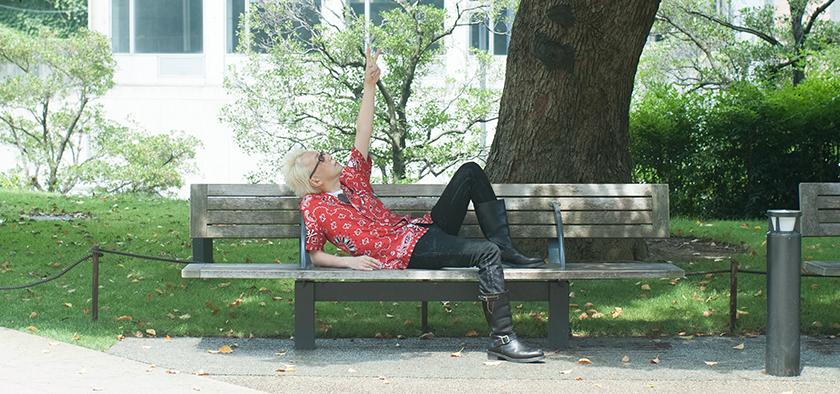
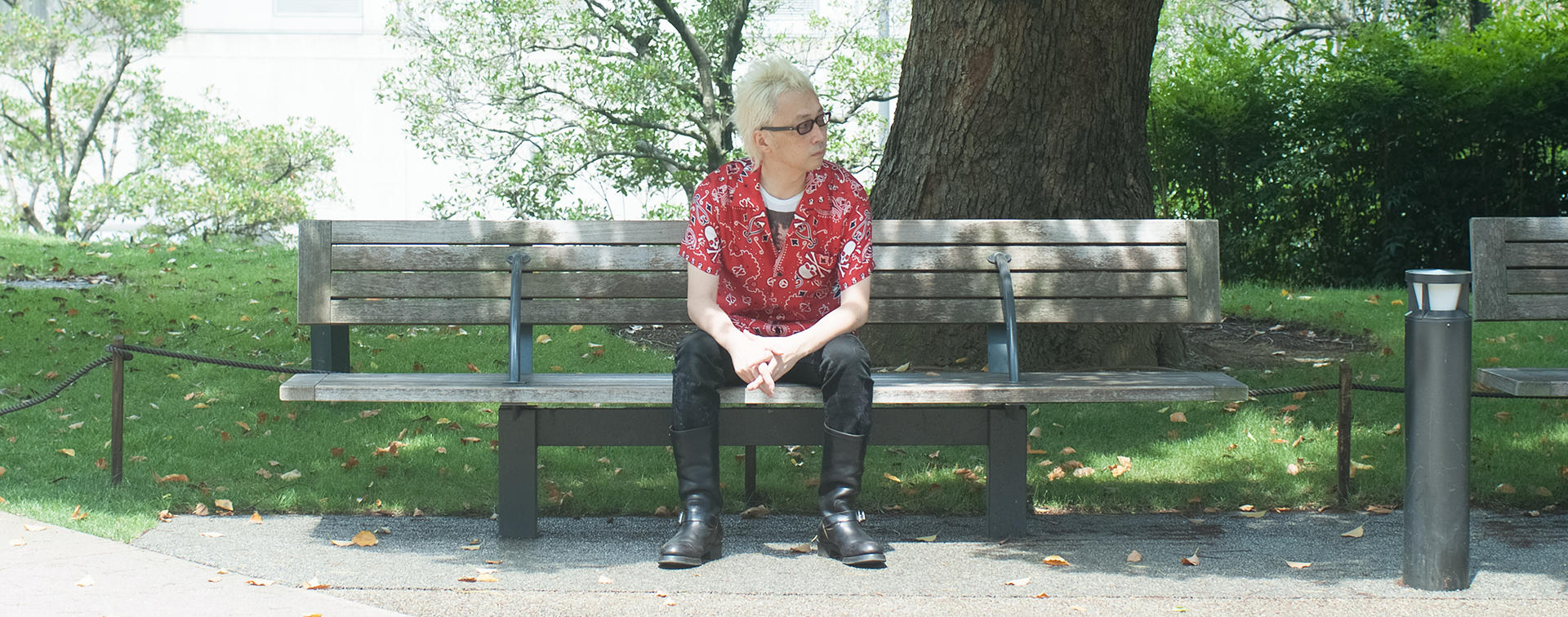
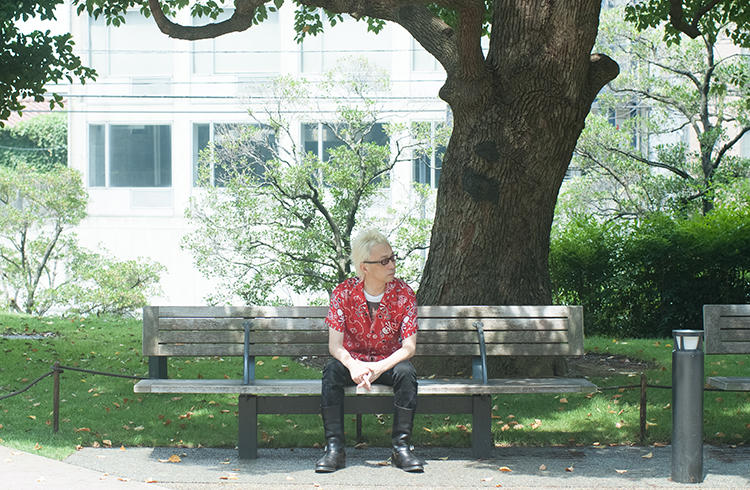
Promoting world peace in Roppongi
Creating a “home” for everyone by distributing prefecture and country badges
- JP / EN
We asked creative director Michihiko Yanai to think of a theme or aspects that could be improved in Roppongi and to tell us about the specific solutions or activities that could be taken. In response to our request, Yanai unexpectedly came up with the theme ""world peace."" Does that mean Yanai feels peace is lacking in Roppongi? We needed to know, but first we began the interview by asking him his impression of Roppongi.
Why Roppongi seems to be a rather frightening place
Roppongi seems to be a rather frightening place. I think this is probably because you hear foreign languages being spoken, and there are lots of people in flashy clothes, and there are people of all kinds of nationalities walking right in front of you. When I say "frightening", I don't mean dangerous; it's just that I feel slightly intimidated. I usually work in Harajuku, and I don't have an image of Harajuku being a frightening place.
When I wondered why this is, it occurred to me that Harajuku is a place that draws people with the same goal - people who want to be fashionable, and look cool or cute. Their purpose is straightforward and pure. Some people come to Harajuku from afar, and they have to return early while there are still trains running. So the streets are empty after eight in the evening. In comparison, people in places like Shibuya and Roppongi seem to be hoping to meet a nice girl ...it's as if they're determined to make a conquest before they go back to their hometowns - the atmosphere is filled with their tension. By the way, these are all my own personal impressions, so please don't take offense.
I guess the young people now are different, but people of my generation have an inferior complex against foreigners. This may be because our faces are larger, or we are smaller than foreigners, or we have shorter legs. Or maybe it's just that we can't speak English, or can't consume much alcohol. I think we've been self-defeated by this inferiority complex. The fear essentially stems from the fact that we don't know about the other person. We don't know which country that person is from, or how old he is, so he looks tougher than you, and naughtier. Maybe I am the only one having these thoughts. (laughs)
The people gathered here are all "onobori-san"?
We tend to think of Roppongi as being on the world's cutting-edge, being right at the center of Tokyo, but most people in Roppongi are probably from all parts of Japan. I'm one of them; it's said that half of the population of Tokyo are from other regions. It must be the same with the foreigners: they can't all be from New York. (laughs) I think there must be many foreign "onobori-san" (country bumpkins) as well - people from simple places such as Oregon or Oklahoma, far away from the big cities.
And such people come to places like Harajuku and don't show that they are from these regions; they know how to hide the fact that they are onobori-san. Also, I think some of the people who gather here are those who want to forget about their homes in the country, who want to leave their hometowns behind them. For instance, a woman might have been a dull office worker in her hometown. But when she comes to Roppongi and wears a miniskirt, everyone compliments her. So she doesn't want her old friends to see her as she is now. I think that's kind of nice in a way. It's good to have a place where you can be born anew.
I sometimes appear on TV, and there are some people who know that I'm from Fukushima Prefecture, so when I'm walking in the streets or when I'm at work, people occasionally come up to introduce themselves. They happily say "I'm from Fukushima too." or "I went to Asaka High School (note: Yanai's alta mater) as well." or "I'm from the class of the year so-and-so." I get the feeling they might have been hiding that all along. (laughs) That's why I'm curious to know the hometowns of the people who walk across the intersection in front of "Almond."
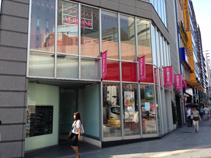
Almond
A coffee shop selling confectionary which opened immediately after World War II. There are other establishments located mainly in Minato ward. During the bubble economy, the Almond shop in Roppongi was famous as the place to wait for people.

Setting up a system to change the streets into "home."

Kushitoro
A ramen shop near Tokyo Midtown which Yanai regularly goes to. Hachinohe ramen and "shijimi" (freshwater clam) ramen made by the shop owner from Aomori Prefecture are well-known.
How about handing out small badges in the shapes of prefectures so people can indicate where they are from? Perhaps there might be those who don't wish to reveal where they are from, but people from other prefectures won't be able to identify a prefecture from its shape. Of course, the badges for foreigners would be in the shape of their countries. A person from South Africa could spot the people of his country by looking at the shape of the badge, and say "I'm from South Africa too! This brings back memories. Have you tried the 'shijimi' (freshwater clam) ramen at 'Kushitoro'?" or "There's a South African restaurant over here." People from the same place could strike up a conversation. People from Fukushima will probably say things like, "I'm from Aizu Wakamatsu City", "I'm from Koriyama City" or "Are you watching 'Yae no Sakura'?"
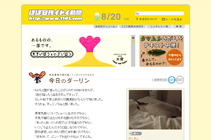
Hobonichi
Hobonikkan Itoi Shimbun - a website run by Shigesato Itoi. The "I'm from here T-shirt" mentioned in the interview was apparently very popular.
Of course, the badges don't need to be worn by people who have abandoned their hometowns or have had plastic surgery to live in Tokyo, or by people who have secretly left their homes at night and would be in trouble if they were forced to return. (laughs) People who will be able to identify the badges will be those who are from the same prefecture or who have an interest in the region. So when you go to a bar, the person sitting beside you might begin talking to you, or at a ramen store, the store owner and the customers could start communicating. It would be ideal to have some kind of system or arrangement where Roppongi could naturally become a "home" for everyone.
When the World Cup was held in France, I planned a T-shirt design contest at "Hobonichi" called "T1 Grand Prix". I designed a white T-shirt with the world map in purple lines printed all over it. This was for wearing to the venue of the World Cup. Its nickname was the "I'm from here T-shirt" because the people you meet would point to the map and say, "I'm from this country". The people might point right next to your belly button or beneath the ticklish armpits - it would start a conversation. My idea for the badges is slightly similar to that.
World peace starting from "Roppongi diplomacy"
I think the Great East Japan Earthquake has something to do with fact that I came up with the theme "Roppongi and world peace". Ever since the nuclear power plant accident, there's been a lot of talk on whether one is for or against nuclear power plants, and there has been so much confrontation. Of course, it is a noble thing to clearly express one's views, but the present situation is of people attacking others with different opinions, even though they themselves don't know what specifically should be done. Whether they are for or against nuclear power, people are living as best they can and want to protect the things that are important to them, and it's really sad that this confrontation has come about.
I'm a member of a unit called THE HUMAN BEATS and we have this song called "Two Shot." It's a song about living with people who have different views from your own. There are lyrics that go: "I want to respect the differences between you and me. I want to treasure what we have in common." I think that sums up what is most important about world peace. Whether through the power of music, or design and art, or by giving advice to someone with a smile on your face, I think we need now to take some kind of action to change the situation, first in Japan, so that people will be able to have dialogue while being considerate of each other.
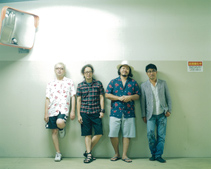
THE HUMAN BEATS
A project consisting of four members: Kiyosaku from the rock band MONGOL 800, Mummy-D from the hip-hop group RHYMESTER, Michihiko Yanai and Seiji Kameda.
The first single "Two Shot" is a charity song whose proceeds are used to help reconstruct the areas hit by the Great East Japan Earthquake.
http://two-shot.jp/
Roppongi has Tokyo Midtown and Roppongi Hills, and many art museums. All the lovable "onobori ambassadors" of different age, sex, and nationality are gathered here, so Roppongi is one of the foremost places in Japan in terms of personnel. There are people here who are extremely suited to making exchanges and promoting peace. The badges could help start dialogue in Roppongi and we might get "Roppongi diplomacy." (laughs) For example, if you become acquainted with a person from Tanzania, and you later saw news about a bush fire in Tanzania, you would wonder whether the friends of your acquaintance were safe; you would feel more directly connected to the news.
It would be good if there was a huge white world map at the side of the police box and people could unhinge the badges from the map. The badges could be exchanged in the way that soccer uniforms are exchanged. The color of the badges for people who live in Roppongi could be gold and the rest could be silver. The gold badges will be for those who have lived here 10 years - like those gold driving licenses.
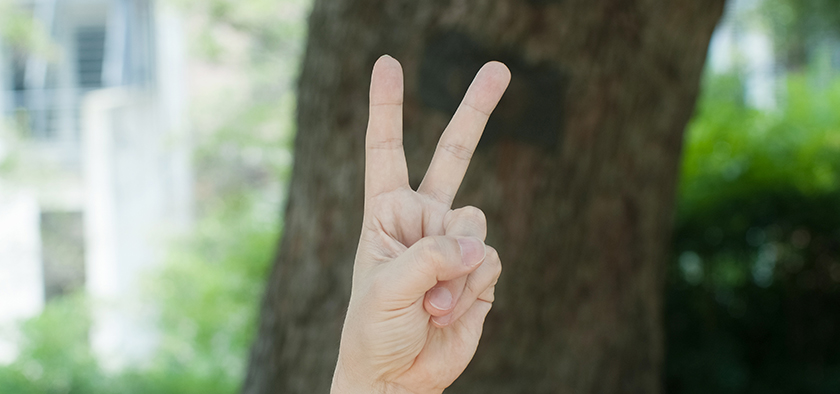
Tokyo would be a kinder place if it felt like home
Sometimes, people from Tokyo tell me they're envious that I have a hometown I can return to. Apparently, Tokyoites feel that they have no hometown, no region of their own. Maybe that is why it's difficult for people to imagine what it's like to lose a hometown. Right after the earthquake disaster, there were notably many people in Tokyo who purchased lots of water to store in their homes. I'm not angry about that and I'm not criticizing anything. I just feel that if people in Tokyo could feel that where they live is their home, the city would be a kinder place.
Of course, I'm aware of how much trouble that people like myself who have come from other regions are causing for longtime residents of Tokyo. We create garbage and make Tokyo dirty, and we inhale oxygen and exhale carbon dioxide and we create all kinds of other trouble. I always feel sorry for that. I think the lyrics that I just mentioned about recognizing differences in each other can be applied to the relationship between people from Tokyo and people originally from outside Tokyo. The question is: how can we have respect for the other person and get along?
I came to Tokyo because I desperately wanted to get into Tokyo University of the Arts. I felt that Tokyo was the only place I could do the things that I wanted to do. Things have changed now, but I didn't much like my hometown then. The distance between people was too close. I felt that people were insensitive and nosy about personal affairs. They were always gossiping. Though they didn't brag about themselves, they put each other down and that atmosphere was stifling.
So I was really glad when I came to Tokyo. This may be an odd thing to say, but there are opportune times to wear a wig, and for me, coming to Tokyo was like putting on a wig. The people around me didn't know what I had been like in the past, and I was able to start a new life. Some people say that it's lonely or frightening not to know the face of the person who lives next door, but I feel quite comfortable with that. People in Tokyo are wonderfully sensitive and very tolerant.
Prefectures and countries do not really matter
For six years up till last year, I directed the commercials for the Tokyo Metro subway. What I wanted to convey in those commercials is that Tokyo is a warm city. Many people say that Tokyo is a scary, cold place, but I wanted people to know that it's a city where you can connect with others while keeping a pleasant distance.
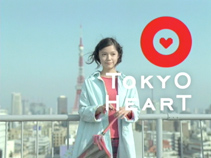
Tokyo Metro subway commercials
The commercials from 2007 to 2012 were directed by Yanai. Featuring actresses such as Aoi Miyazaki and Yui Aragaki, the commercials used expressions such as "Tokyo heart" and "Tokyo wonderground."
But maybe it would be inconvenient for some people if the image of Tokyo as being a scary place is not maintained. (laughs) After all, there are hit songs that are about the frightening aspects of the city. For example, there are lyrics in Yumi Ota's "Cotton Handkerchief" that go: "Please come back, untainted by the colors of the city". And the song "Tokyo Desert" by Hiroshi Uchiyamada and the Cool Five describes Tokyo as being like a "concrete jungle" - that expression is used a lot, isn't it? It makes me wonder why so many people come to Tokyo in the first place. I guess though, that the negative image of the city makes people even more determined to come here - it's like a hurdle you have to jump over. And when your dreams are shattered, and you go back to your hometown, those songs become the background music.
Maybe it's not appropriate for me to say this at the end of this interview, but I actually don't care about the badges. The prefectures in Japan were decided by someone after the Meiji Restoration. Kankuro Kudo-san was saying that he didn't like the words "hisaichi" (disaster-hit area) and "hisaisha" (disaster victims). He said that Japan as a whole is the hisaichi and the Japanese people as a whole are the hisaisha. I feel that in the same way, you can say that Japan is home, and the world is home. I just think it would be nice if by wearing badges, people could come closer to each other and realize that in the end, differences in prefectures and countries don't matter.
Editor's thoughts
Yanai-san came to the interview saying he did not have a properly thought-out proposal, yet he talked smoothly, moving easily from one topic to the next, and even came to a fitting conclusion. It was impressive how he did this, while also making small talk and telling us about many interesting episodes. I have interviewed Yanai-san several times before and have always felt it a pity that some parts of the interview had to be excluded from the article. This time, I have written about some of the small talk that Yanai-san made which was not included in the article. We hope you will read this too. (edit_kentaro inoue)




